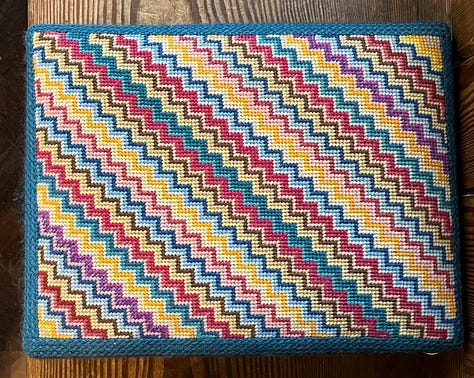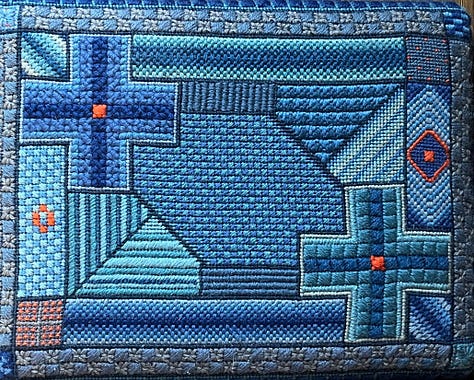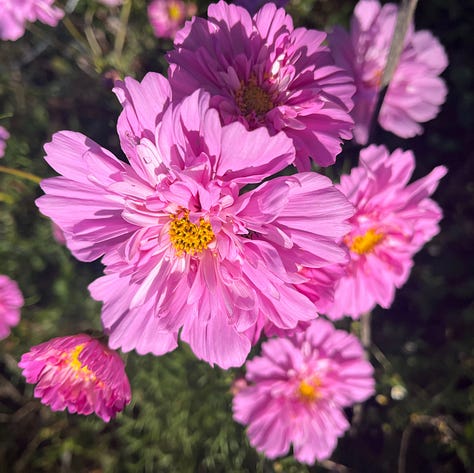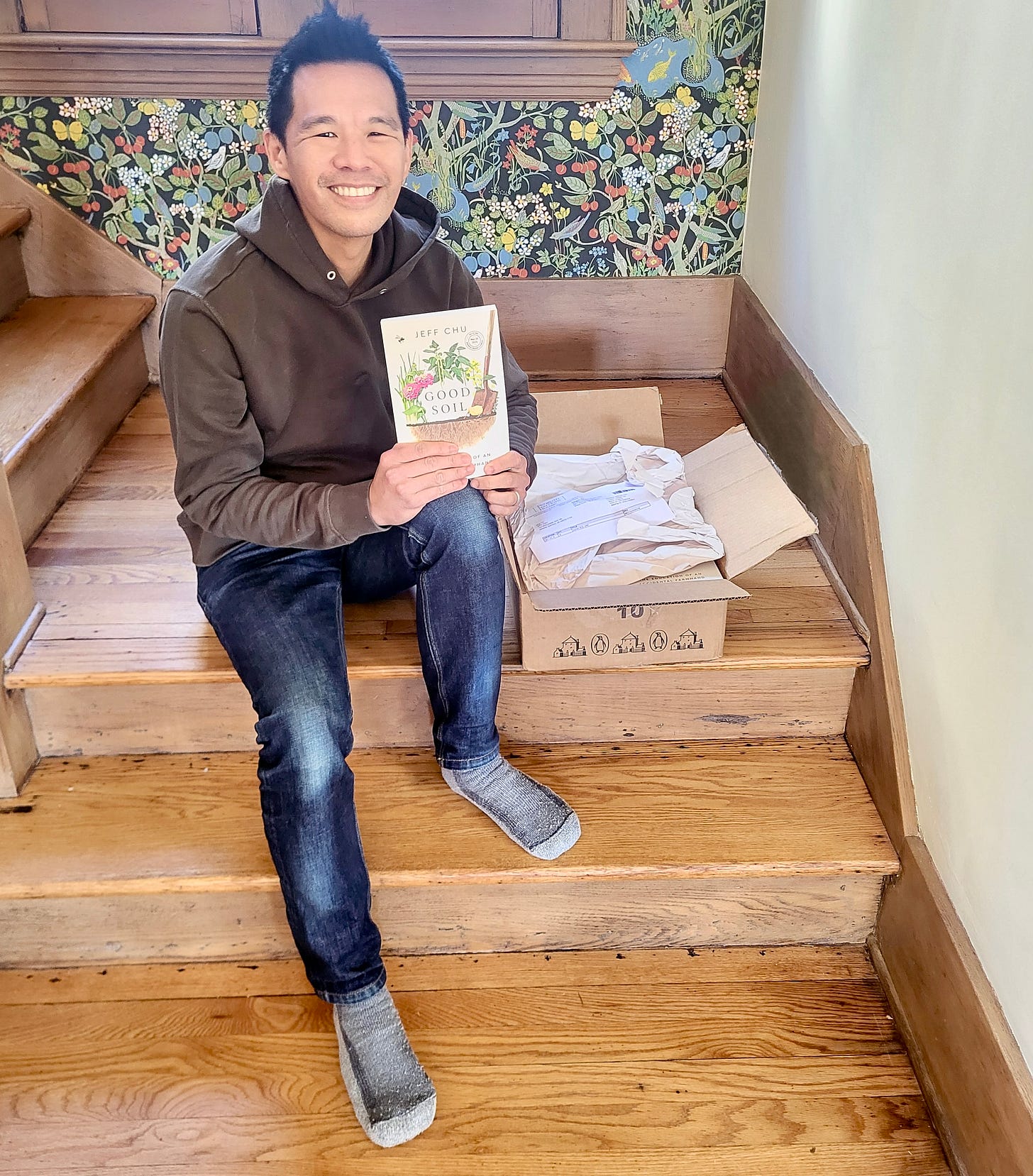Bless Us
Some fragmented thoughts on church kneelers, divine intervention, a grim anniversary, Lebanon, garden perseverance, and book galleys
Thursday, October 10
Grand Rapids, Mich.
Tristan and I went hiking in the Cotswolds two weeks ago, and I did not post a single thing about it on social media. Did it really happen? You’ll just have to trust me.
In Painswick, we stopped in at St. Mary the Virgin, the parish church at the heart of town. Parts of the church building date to the 1370s, though the Domesday Book testifies to a worshipping congregation in Painswick hundreds of years earlier.
In the St. Mary’s churchyard, 99 Seussian-looking yew trees have stood since the 1700s. Legend has long had it that, were a hundredth tree to be planted, the devil himself would strike it down. Which led to a conundrum in 2000, when the Diocese of Gloucester gave each parish a yew sapling to mark the millennium. What to do? The parish leaders bravely planted Tree No. 100. To date, the devil has let it be.
My favorite things at St. Mary’s were the kneelers. I found myself meandering through the pews, examining these works of embroidered art: Striking geometric patterns. Coats of arms. Rich florals. Lots of crosses. Also: Fish, and a parakeet, and a raven holding a ring (a Hungarian legend, Google said), and one particularly elaborate village scene featuring a nun with a falcon.
Kneelers “are representations of place, community, history, and hope,” writes British artist Lally MacBeth, who curates the Church Kneeler Archive, an Instagram account featuring kneelers from parishes all across the U.K.. “To visit a church and look at its kneelers is to revel in the unique identity of a town and its people.”
The St. Mary’s kneelers date to the 1980s, when church steward Anne Yeo rallied community members to stitch and stitch and stitch and stitch. Over four years, they created some 300 pieces, which have since cushioned generations of saints as they kneel to pray.









I suppose I’ve been thinking about the kneelers this week because of all that’s happening in the world: incessant war, devastating storms, political discord, the flourishing of lies, the fraying of community. Though it can all feel so immediate and unprecedented, these have been part of humanity’s story since time immemorial. Technology has transformed our access to the news, of course. We see and hear more of that story, in live video and blaring headlines, more than ever, even as our capacity to absorb the awfulness of it all remains largely the same.
Which is why I am glad that this, too, stays true: Whatever life brings, people all over the world, across cultures and religions and eras and eons, have always sought help and hope from without. When they don’t know where else to go, they have turned to the divine, falling to their knees and grasping for the lifeline that prayer offers.
Some might say it’s foolish to wish for divine intervention, and certainly there are moments when it feels that way to me. But even if prayer offers just a moment to gather oneself and to be gathered to something beyond oneself—to feel a bit less alone—isn’t that worth it? Perhaps the very act of confessing that one cannot hold it all, not in these tiny hands, is the surrender we need to hold what we can. And perhaps then we can then resolve to do what we can, determined to bring a bit of the divine to someone else in need.
The other morning, I set my phone down after reading yet another heartbreaking story, I thought again about the St. Mary’s kneelers, and I wrote a prayer to remind myself of all these things. Maybe you could use it today too.
God, it’s just too much. Too much for me. Too much for any one of us. Surely it isn’t too much for you. I want to believe it’s not too much for you, and— Maybe it isn’t too much for us together.
God, if it’s just too much for me, will you show me a different way? Where do I find another hand to hold? How do I lean on another’s shoulder? Or maybe I can offer a hand or lend a shoulder. Maybe it isn’t too much for us together.
God, if it’s just too much for me, remind me that it’s not all on me. Walk me out of complacency, but let me just taste the fruit of patience. Grant me a glimpse of possibility, and give a glimmer of hope. Maybe it isn’t too much for us together.
God, if it’s just too much for me, return me to belonging. Stir in my bones the strength of the ancestors, and let my spirit ride on the wings of the saints. Be our peace amidst war, our calm in the storm. Maybe it isn’t too much for us together.
What I’m Reading: A few days ago, the world marked a year since the horrific Hamas attacks of October 7—a year filled with violence and retribution, escalation of war and unending terror. Beyond the Middle East, there are all the stories that have faded from the headlines or rarely even registered—Ukraine, Myanmar, Sudan, Haiti, Congo. All evidence to the contrary, leaders continue to believe that they can kill their way to security and bomb a path to peace.
Rabbi Danya Ruttenberg, a voice I often turn to for solace, wisdom, and strength, wrote a moving reflection on the anniversary of October 7. “I believe that if I could see, even just a glimpse as God sees—then I would feel even more certain that God is found in the choice to help, to mend, to care, to build, to create covenants of peace. To use our hands for holding. For sterilizing wounds. For tenderly wrapping the dead in preparation for burial,” she writes. “We all as a collective, as a people, as a world, as those forging a new future, cannot offset the atrocities that have been caused, but we can annul the severity of the decree. We can change tomorrow.”
This sacred work, of course, is undoubtedly beyond any one of us as an individual. But note that she says “we all.” We can each do our part. I believe it. Otherwise I wouldn’t waste time writing to you. Ruttenberg reminds me once again of the importance of teshuvah: “returning to ourselves, to integrity. To our willingness to tell the truth, to accountability, to committing to a new way of being and doing in the world.”
May it be so.
Her entire piece is worth a read.
Last spring, I wrote to you about the Rev. Linda Macktaby, a remarkable human working amid horrific circumstances to alleviate suffering in Lebanon. In the months since, things have only gotten worse for Macktaby’s people.
I have been to Lebanon twice, most recently in the spring of 2010, for the joyous wedding of a dear friend. Every single city I visited on that celebratory trip has now come under attack from the Israeli military: Beirut; Baalbek, with its famed Roman ruins; and Jounieh, a gem on the Mediterranean. In Jounieh, my friends and I took a cable car up to the shrine of Our Lady of Lebanon. Etched into the entrance of the shrine are words from Sirach, quoting Wisdom herself: Quasi cedrus exaltata sum in Libano—“I was exalted like a cedar in Lebanon.”
I know we are not seeing much exaltation of wisdom in Lebanon, or among many Middle Eastern leaders, today.
Macktaby told me this week that the situation in Lebanon is growing ever more dire. Her parents have fled their home in Beirut. Even as she was sending me voice messages, Macktaby was helping some friends pack up and evacuate from another section of the city. “It is terrible,” she said. “We have to do this really quickly, because we don’t know when things will get bombed again.”
The relief shipments that she was dispatching to villages in southern Lebanon have had to end, because travel is impossible. Anyway, most of those villages are now deserted, and many have been completely destroyed. Macktaby is offering pastoral care and, when she has the money, providing meals to people from the south who have fled to what had been the relative safety of Beirut. She also continues to coordinate deliveries of supplies and aid to refugees sheltering in the city of Tyre. She has a few friends who are shuttling back and forth, she said, “risking their lives.”
A short time ago, she texted to say that airstrikes had hit Achrafieh, a once-elegant part of Beirut I remember well—“four minutes from my home,” she said. Fifteen minutes later: “Two more attacks now,” she wrote. “I pray they stop. There was no warning. God have mercy on us!”
If you would like to support Linda Macktaby’s valiant relief efforts in Lebanon, you can donate to a special fund set up by my denomination’s refugee-care team.
What I’m Growing: Amid all this, the garden still teaches me. We were away from home for a couple of weeks, a dry spell here in West Michigan, so I expected things to be faded or dead when I returned. Instead, I found plenty of tomatoes and late-season flowers—reminders of grace and testimonies of perseverance.



Galleys for Good Soil arrived at our house yesterday. Such a surreal feeling to hold in my hands an early (read: imperfect and marred by some typos) edition of the book.
A follow-up to my request last week for suggestions on potential book-tour stops next spring: If your bookshop, church, or organization might be interested in hosting a visit, I’d love for you to fill out this form. That will help my team prioritize and schedule.
Programming note: I’ll be at Crosspointe Church in Cary, N.C., this Sunday. If you’re in the area, please join us for worship at 10 a.m. ET. I’ll be preaching on that “full armor of God” passage from Ephesians.
Then, at 11:30 a.m., in-person only, I’ll be facilitating a community conversation called “Finding Hope, Making Peace, and Forsaking Cynicism in a Politically Divided World.” No big deal, right? Just a nice, casual topic. The event is free, and lunch is provided, but we ask that you register here in advance.
That’s it from me for this week. What’s on your hearts?
All my best,
Jeff







First, Jeff, I love reading your words. I want to share them. And then I got to the end...put on the full armor of God. The last 10x I've heard my dad speak, 8 of them have been on this passage. And he wrote a book on it, I can send it to you if you want (I'm joking). My dad was a chaplain in the army. So I would like to hear a softer message from you on this.
Praying with you to hold and be held. What a time we are living in.